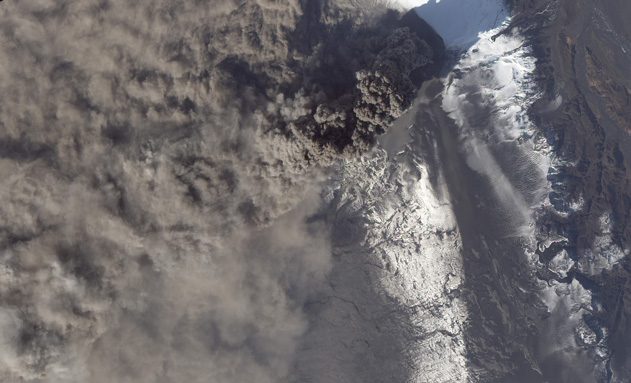by Ian de Stains OBE
What are we to learn from the fallout from Eyjafjallajokull? Perhaps how to pronounce the ill-tempered volcano’s name? (My former colleagues in the BBC pronunciation unit—who frequently saved my bacon in the days when I was reading the news—give it as AY-uh-fyat-luh-YOE-kuutl-uh—if that helps.)
There ought to be other lessons. First and foremost—and one that we should by rights have learned a long time ago—that Mother Nature is a force to be reckoned with that is far greater and far less predictable than we are wont to give her credit for. Ever-advancing technologies allow us the comforting delusion that we are closer to predicting earthquakes, that we can control the climate, and that we are increasingly the masters of our planet (even as the evidence suggests we are more likely to be the overseers of its destruction).
Eyjafjallajokull’s eruption and the conspiring winds that carried the potentially destructive volcanic ash across the majority of Europe’s air space led to a travel shut down that is unprecedented. Even the response to the events of 9/11 was eased in half the time. Tourists and travelers alike were inconvenienced in an unprecedented way but—arguably more importantly—business around the world was disrupted in a way not foreseen. An entire village in Kenya, dependent on its rose harvest, most of which is destined for European markets, was devastated; automotive production plants in Japan were shut down because much needed parts from the UK were held up; Tokyo department stores lamented the lack of smoked salmon from Scotland.
So: another lesson—and one that we ought not really need to be reminded of—is that in our inter-connected, increasingly global community we are all at risk. Or put it another way: we are none of us immune.
The immediate shock put aside, recriminations began. The airlines and European governments were accused of over-reacting; of shutting down their air-space unnecessarily or for longer than was needed.
Lesson three: you can’t win. It is understandable that those stranded were distressed and would want to find a way home as soon as possible. And it is equally understandable that an airline doesn’t want to see its income shredded. But imagine if a single government had decided to permit a flight and that flight had encountered a situation similar to the BA flight in Indonesia some 30 years ago and, especially, if it had not survived it. There would have been outrage, recrimination and lawsuits the likes of which we’ve not yet seen.
The biggest lesson of all, though, must be a wake-up call. We have become so dependent on air travel and similar instant solutions to our business needs; is it time to consider a backup, an alternative—and if so, what form might that take?
Ian de Stains is the executive director of the British Chamber of Commerce in Japan. Views expressed in this column are purely his own and are not necessarily endorsed or shared by the Chamber.Photo by NASA Goddard Photo and Video
External Link:
Eyjafjallajokull, Wikipedia









